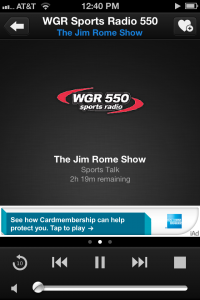When Buffalo Bills training camp began in July, Buffalo, NY sports radio station WGR upped their camp coverage. They added the John Murphy Show to their evening lineup, allowing the longtime Buffalo Bills announcer to report in-depth on a Bills team with great expectations.
I listened to the show’s first broadcast on July 26th while on the commute from Boston to Salem, MA from my iPhone via the TuneIn Radio app. I wasn’t alone. When Murphy took his first round of calls around 7:45pm that night, most of his callers weren’t Western New Yorkers, but listeners from North Carolina and Pennsylvania.
When I want to listen to sports radio, I’m no longer turning on a physical radio with knobs and an antenna, but services such as TuneIn. I am no longer limited to the offerings of my geographical area, and I “humble brag” as such all the time on Twitter. When I am able, I listen to WGR, Rochester, NY (my hometown)’s John DiTullio Show on 1280 WHTK, or even radio stations from the Midwest. Even though I have lived here for eight years, I don’t listen to Boston sports radio regularly, because half of my sports interests and allegiances don’t align with the geographic area in which I live.
And, thanks to technology, that is not a problem in 2012.
———
What is a problem is something I touched upon in an article I wrote in January for SBNation Boston: large media entities thinking sports radio should go national. The article’s Twitter length synopsis: Smaller regional markets are losing local sports programming in favor of syndicated national programming like Mike and Mike In the Morning and the Jim Rome Show.
The move towards generic national sports programming has hit major markets as well. Today in Boston, 1510 AM (home of Boston University hockey) becomes a charter NBC Sports Radio Network affiliate – with just two hours of Boston-centric weekday sports talk programming. The rest is filled by NBC’s national lineup and previously contracted programming harkening back to their time as a “progressive talk” station. (Boston Radio Watch sums up the news here, and regularly tweets about his and other Boston radio moves here.)
More national sports radio looms, as CBS Sports Radio starts hourly updates today and starts a full lineup of national sports programming in January 2013, including the aforementioned Rome. In the Boston market, CBS Sports Radio is aligned with 98.5 The Sports Hub. No word onto how the national offerings coming in January may fit into the popular existing 98.5 lineup (though the station does have national programming now, so this would probably just fit into those existing spots.)
The move towards national is cost effective – it puts sports talk, a hot commodity, on many stations for the least amount of money. You can sell national advertising. You don’t have to pay on-air talent in smaller markets with tight budgets. From a purely economic basis, it makes sense.
But technology may make this a moot point.
Why would I want to listen to generic national sports programming that will be dominated by the winning or most profitable teams of the day, when I can listen to local sports programming involving the team I am interested in hearing about by just opening another browser window on my computer? If that local-centric programming doesn’t fit into my listening window, no worries – I can just listen to it on-demand on the station’s website.
As how we listen to radio has changed, why is programming is becoming homogenous instead of diversified? If I want to listen to a national broadcast, why would I turn to my car or physical radio to do so? I would just go online. I don’t need a terrestrial radio station to play that national programming.
As technology has changed mass communications, the struggle between global, national and local has been one of the core issues. Do media consumers want news from one block over, or news from time zones away?
The one overarching thought that seems to work is that people want to see themselves in their news. They want to know that their opinion has value, that others know what they’re going through, and a turn in the spotlight. Like it or not, we live in a me-first society. When I create web properties and communications strategy in my full-time job in education, one of my main missions is that students can see themselves in whatever we say or do.
In order for sports radio to survive, they may want to take the same approach. Going national doesn’t allow the listener to have their turn in the spotlight, but instead reduces their chances. National sports stories rarely allow listeners to find a shared common denominator with the subject or media member. Local sports programming, where the local college or high school team has a shot of being discussed and callers don’t have to fight the entire nation to get on air to discuss a national sports story, might feed the me-first monster better.
And when sports radio that serves my own interests – whatever they may be – is only a website away, why am I going to listen to a local station broadcasting national talk?
